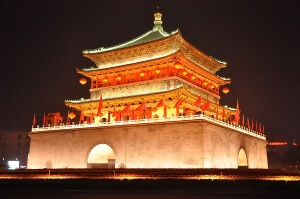China and Israel set for massive fintech and VC collaboration as organization meets innovation
What has China, a vast and sophisticated nation of over 1.35 billion obedient, smart and urbane citizens who work accurately and produce the majority of goods for the entire world got in common with tiny Israel with its meagre 8 million population, whose entrepreneurial and innovative “out of the box” free spirited mindset appears to […]

What has China, a vast and sophisticated nation of over 1.35 billion obedient, smart and urbane citizens who work accurately and produce the majority of goods for the entire world got in common with tiny Israel with its meagre 8 million population, whose entrepreneurial and innovative “out of the box” free spirited mindset appears to be China’s polar opposite?
The answer to this conundrum is quite simple: China views Israel as one of its most favored partners with which to fund the development of high technology via venture capital-funded startups.

The suit-and-tie, hierarchical and structured, manners orientated business world of China is a marvel to behold. FinanceFeeds’ Andrew Saks-McLeod has conducted detailed research into the vast entities which operate in the electronic financial sector, venture capital and the referral of vast amounts of business to Western firms.
The ultra-slick approach of the Chinese appears at odds with Israel’s jeans and t-shirt wearing entrepreneurs who vehemently refuse to stick to traditional corporate methodologies in order to come up with revolutionary inventions ranging from breakthroughs in medical science to fintech, however the synergy between the two ideologies is imemnse.
According to research by Tel Aviv-based IVC Research Center, investment from China is flooding into Israel’s venture capital funds and high-tech companies.
Just this year alone, high tech financing to the value of $500 million and venture capital to the value of $750 million will include at least one Chinese partner.
IVC Research Center stated that
Mostly since 2011, as many as 80 Israeli companies and 11 Israeli venture capital funds have raised money from China sources, IVC reports. The trend line is definitely upward. Chinese-Israeli tech deals totaled $300 million in 2014, up from $50 million in 2013, according to Israel’s National Economic Council.
The synergy lies in the marriage of Chinese manufacturing and financing efficiency, finely honed corporate structure, excellent management procedures, a government-provided distribution channel to the entire world and vast economies of scale with Israel’s prowess as a land of ultra-high tech inventors.
The Israeli brain power can come up with the leading edge fintech, medical or commercial product, and the Chinese brain power take it to the world with ease.
Avi Luvton, Executive Director for the APAC region at the Israel Center for R&D said
Israeli companies are looking to China for market expansion opportunities. Both countries are leveraging their scientific and research knowhow and joining together to enhance progress in a next generation of technology. China is expected to soon surpass the U.S. as Israel’s biggest collaborator in the number of joint government-backed development projects.
Israel’s business-minded populace has embraced the opportunity of working closely with China, the world’s most committed economic and industrial powerhouse, for quite some time.
Whilst the majority of the world focuses on the demise of the European economy and the unrest that continues to blight Western Europe as their leaders focus on non-business related factors such as demographics, fixation with social projects, welfare dependency, bail-outs and political agendas, China’s entire business community is free from such irrelevances.
Where Israel is a business-minded go-getter, mainland Europe is an indebted political quagmire, hampered by socialist legacies and anti-capitalist discourse.
Two years ago, Israel’s then Economy Minister Naftali Bennett committed a lot of effort toward furthering ties with China.
Mr. Bennett said at the time on Israeli national news that Chinese industry is highly effective and eager to do business. He explained that whilst many nations are bogged down in boycotts and non-productive political agendas, “All the Chinese are interested in is Israeli innovation and how they can make use of it.”
“In all the 20 meetings we held, not once were we asked about the Arabs, or about the Palestinians, or about any occupation or anything else. All they care about is Israeli high-tech, Israeli innovations, and how we can bring these technologies here. We met ministers and CEOs of companies and the heads of the state. So the main insight is that Israel needs to lead its economic diplomacy, not constantly deal with the political issues, where we don’t always have an answer, but lead through the economy.” – Naftali Bennett
Whether issues over intellectual privacy protection could arise for Israeli strongholds in biotech, cybersecurity and software remains to be seen.
If Silicon Valley’s experience can be used as a benchmark, the increasing cross-border investment between Israel and China could be mutually beneficial. According to the IVC Research Center in Tel Aviv, founders of tech startups in California with recent investment by Chinese technology leaders have stated that their businesses are progressing faster with Chinese capital and through introductions and collaborations, easier access to the large Mainland markets. It is FinanceFeeds’ conclusion that, rather like in Israel, Chinese business is very reliant on introductions and relationship building.
For their part, leaders of China’s tech titans that have planted R&D, business development and sales offices in the Valley are gaining by learning more about a culture where it is ok to fail – and then get up and try again. They are getting a look at some of the earliest invented-here technology – natural since Silicon Valley still reigns as the world’s leading hub.
Since Chinese IBs are still the major driver of business to Western retail FX firms, and Israel is the R&D center for many fintech and electronic trading vendors, platform firms, ancilary software developers and signal providers, the synergy between the two nations is indeed poignant.









